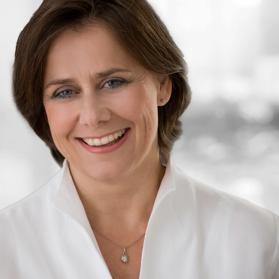HR must become simpler, bolder and faster. And HR functions must think much more in systemic and holistic contexts in the future. This is what Georg Pepping, who as Managing Director Human Resources is driving the agile transformation at T-Systems, demands in an interview with Detecon Partner Marc Wagner. Pepping explains why many executives have such a hard time with the change processes in their companies, why being an expert is gaining in importance over classic hierarchies, and why HR must set a good example in all change processes. Pepping's conclusion: Inseparable from any form of agility is the ability to adapt to rapidly changing circumstances - and that includes learning!
Detecon: If you follow the discussions about agile transformation, you get the impression that it is not so much the employees who are having a hard time with the change, but above all the managers. Why is that and where do you see the sticking points in the personal agile transformation of managers?
Georg Pepping: I do observe a number of different things. One point is certainly the issue of "command and control. Many managers have grown up with the expectation that they have to be involved in every detail and have everything under control at all times. This leads to a certain management style, a certain management structure and certain control mechanisms. Working in an agile way also means being able to hand over responsibility to teams and leading through trust. This works differently and brings us to point two: one's own role changes, one's management style changes, the focus I set as a manager changes. Point three relates to the level of status and understanding of one's role: Naturally, one thinks about whether one is losing influence. And so managers first have to learn that in agile matrix structures, such as we have in T-Systems, they can exert more influence with a changed management style and that their business can certainly be successful, even though they don't control every detail. Difficult, but doable.
Detecon: How do you absorb this fear of losing a large part of the tasks, reputation, and privileges?
Georg Pepping: T-Systems has always had executives outside of management positions. These are expert functions, for example as project managers of large TC and IT projects. However, I believe that we need to move away from hierarchical thinking even more, especially when it comes to compensation models. With agility, expertise continues to gain in importance - and this must also be taken into account at this level. In addition, a different understanding of power must prevail. You don't get power through a position, but by making a difference as a person. Influence, not position, is the decisive factor. This has to do with competence, with expertise, but also with the ability to win over different groups of employees. This understanding must mature, and we support our managers in this change process with suitable programs. This is a change process that each of us must go through, and yes, it sometimes takes more time and sometimes less. We can deal with anything but the attitude of "I'm not going to get involved." Our expectation is very clear in that regard.
Detecon: For teams in an organization, this means more responsibility. How do you assess the degree of maturity within the organization for this and what is being done to ensure that employees can actually accept and assume responsibility?
Georg Pepping: It doesn't make sense for everyone to wait until some degree of maturity is reached, as in the chicken-egg principle. That doesn't set any transformation in motion. Rather, I propagate a culture of positive failure and learning, which we simply have to practice. I would rather have gone too far, dared too much and failed than not have tried at all in the first place. It is then important to learn quickly from mistakes and to be able to implement what you have learned - learn & adapt. The successful design of an agile transformation therefore also has a lot to do with a healthy error culture. That is why this element was and is also part of our change program to accompany the transformation. Elements such as retros, post-mortem analysis, best practice sharing, exchange and dialog are important components of such a culture. I believe that the individual grows with the group and the group with the individual.
Detecon: What does the agile organization mean for HR?
Georg Pepping: A credible transformation depends on taking one's own steps first before demanding them from others. An HR department in particular cannot credibly shape and support agility in a company if it does not take the step into an agile organization itself. That's why it was indisputable for me - and incidentally also for my colleague Christoph Ahrendt, who is responsible for the finance function at our company - that we also bring our divisions into agile structures right at the beginning. This is also a learning process for HR. But the experience helps us a lot in answering the question of how we support the business in becoming agile. So what does agile working mean for us in HR management? Basically, the same applies to HR processes, products and services as to the business function. Employees rightly expect their employer to make HR services and products easy to use. Managers and employees also have an increased need for change support and thus for HR's consulting and coaching role.
Detecon: Does HR have to develop completely new competencies?
Georg Pepping: Yes. The change of role that we exemplify brings that about. For example, organizational management must become organizational development. Organizational development will be much more closely intertwined with HR development. HR functions will have to think much more in systemic terms.
Detecon: That would mean that representatives of different functional areas work together on a product or a service?
Georg Pepping: Up to now, the competencies within the Group have been rather Taylorite: Succession management alongside talent management alongside recruiting alongside performance management. In the HR business partner area at T-Systems, too, we were classically structured according to organizational areas. At T-Systems, we have changed the business partner function more in the direction of a project or pool organization in the form of chapters. In the Group, these topics are currently being grouped together in so-called tribes. This is what I mean when I say that we need to think and act in a more systemic and holistic way. From the customer's point of view, HR language is often very technical, very detailed. In contrast, there is a customer, employee or manager need to think and implement in a simple way. HR IT" or "HR Tech" is another important design factor to be able to deliver our topics digitally. Holistic, interdisciplinary collaboration in agile organizational structures around agile methods like Scrum are the key building blocks of change for HR. Why Scrum? So that we can realize rapid and iterative development of HR services and products, making us simpler, bolder and faster. What started back then in software development is now also more and more in product development at HR.
Detecon: Each area speaks a different language. How do you overcome language barriers in cross-functional product teams? How do you ensure that ramp-up times do not become endless?
Georg Pepping: In some places you have to be slow at the beginning so that you can be fast in other places. When we pull people together from different areas, as happens in the Tribes, then of course you need more time at the beginning to get to know each other, to build a relationship, to find a common language and a common goal. To some extent, the methodology we developed there helps us, but we go through the process of "Storming, Norming, Performing" there as well. The most important experience I can pass on for the introduction of agile structures is therefore never to expect results too early! This can quickly lead to either working in a seemingly agile manner or to looking at certain partial successes in the short term, but not taking the long route. In addition, I think it is important that we reflect on ourselves and actively solicit, absorb and integrate feedback. Behind this is a willingness to get involved and to see this change as something that is exciting. We are addressing this point as part of the change project, and I have to say that I am experiencing a lot of enthusiasm. I am convinced that companies that sustainably pursue this topic and keep it on the agenda for years will also be successful in the end.
Detecon: Being allowed to make mistakes and to give feedback are elements of a learning culture which ultimately ensures that every employee is able to keep his or her competencies up to date and to gain experience. How do you succeed in putting these topics on the same level as daily work?
Georg Pepping: This is about the way we learn, how we understand training and qualification. If processes change more quickly, if knowledge becomes obsolete more quickly, then I also have to understand learning differently. Our idea is to build on the "growth mindset" model. People are capable of change. And most people are also willing to change. New technologies provide us with many opportunities to learn quickly and easily - that's just fun. One of my tasks is to give employees and managers access to these opportunities. With "You Learn," our Group campaign that will be launched soon, we are starting a change initiative on precisely this point. This initiative will be complemented by a systematic skills management process. If we know that we will have massive changes in certain areas, we try to set up re-skilling and up-skilling measures at an early stage.
Detecon: So a revival of total workforce management?
Georg Pepping: The topic of "skill-based workforce management" is not new, but the pace is different. Added to this is the shortage of skilled workers for digitalization. More and more companies will not be able to get graduates or trained personnel in certain new technological topics at all quickly. This gives learning a different weight. In my view, this is a strong driver of change and investment. It's certainly not for nothing that learning is one of the biggest markets worldwide. When I look at which providers are making training content available globally, it's quite impressive.
Detecon: Good news for the workforce! After all, the point is to concentrate even more on building up the competence and skills of the employees because the de facto shortage of skilled workers means that external recruiting cannot take place to the same extent as we have built it up internally up to now.
Georg Pepping: It has always been our policy and our aspiration to retrain wherever I can. This makes sense for business reasons alone, because recruiting is always more expensive than training. What is certainly new is the development that several industries are looking for the same skills - for example, IT: Not only IT companies are looking for specific skills, but Bosch, Daimler, VW and Vorwerk or Deutsche Bahn are now doing the same, because digitalization is making its way into all companies and industries and consequently they all need comparable skills. This in turn places new demands on recruiting and affects the topics of attractiveness as an employer and employer marketing. Above all, however, it affects the way we prepare our employees for future changes. "Stock qualification" is a non-word, but when market times and processes become shorter and shorter, you inevitably have to become better and more proactive in skilling. This is where "You Learn" comes in.
Detecon: Is learning the next big topic after the agile wave?
Georg Pepping: I don't think you can separate the two at all. If we understand agility as the ability to adapt to rapidly changing circumstances, then learning is part of this ability. Consequently, in my view, learning is more a component of agility. I cannot imagine agility without learning.
Detecon: Customer centricity is one of the major goals of agile transformation. How do you ensure that all the activities of the employees and managers generate concrete value for the customer?
Georg Pepping: We have already completed part of the journey and are seeing the first successes. Our transformation is based on the belief that there is no successful business transformation without successful people transformation. The mental model we are working with and which stands above the entire transformation is called Outward Mindset: everyone's attention, thinking and actions are focused on how they can help others serve our customers better. I personally believe that agile transformation creates freedom for employees. This opportunity makes people satisfied. Both together, customer satisfaction and employee satisfaction, form a successful T-Systems.
The interview was conducted by Marc Wagner.






